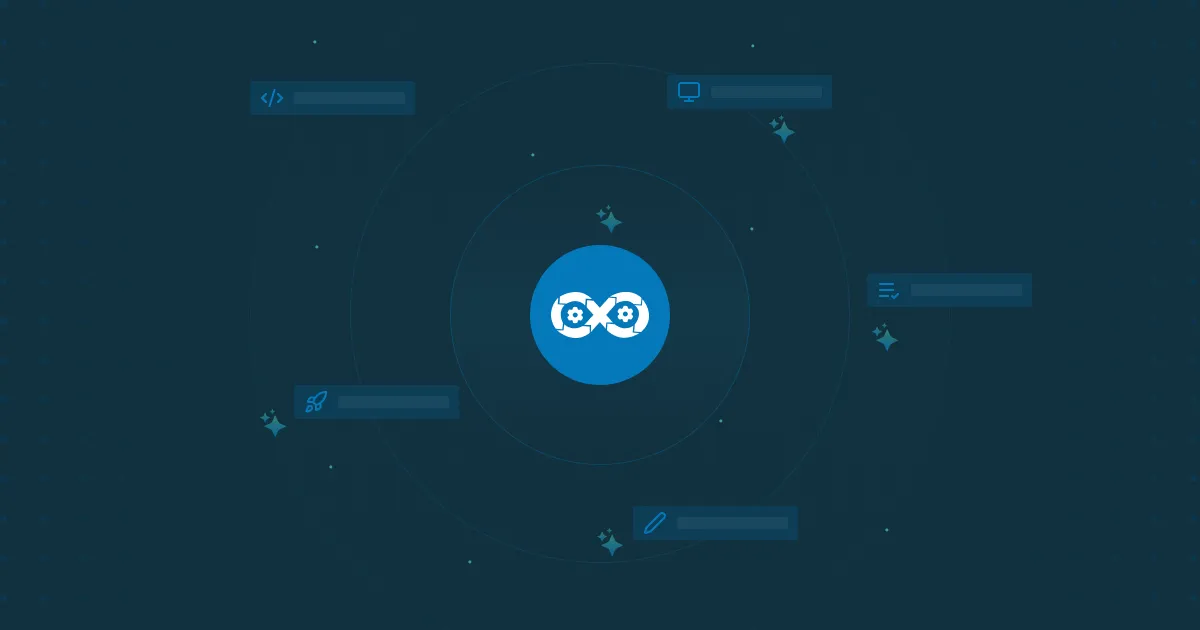Best 7 Atlassian Alternative Platforms in 2025

Atlassian platform offers a DevOps solution and other third-party tools for comprehensive DevOps processes. It breaks information silos and improves connection between teams. However, alternatives may offer more competitive pricing, better value, and user-friendly experience tools.
Choosing an Atlassian alternative can be a strategic decision for several reasons, depending on your organization’s needs, budget, and workflow preferences. While Atlassian is highly customizable, finding an alternative may be more flexible and offer better speed and reliability.
This article covers how to find your best alternative for Atlassian and what the benefits are as well.
Why Choose an Atlassian Alternative?
There are many reasons to consider alternatives to the well-known Atlassian products, ranging from improved user experience to enhanced performance optimization. Here are the main reasons why teams might seek an alternative:
- Cost: Atlassian's tools can become expensive, especially for growing teams or enterprises. So, alternatives offer a better price.
- User Experience: Some users consider Atlassian tools to be too complicated. That’s why alternatives provide a more efficient and user-friendly experience.
- Flexibility: While Atlassian is highly customizable, other options could offer more adaptable methods of customizing the platform and being more flexible.
- Performance: Users sometimes report performance issues with Jira and Confluence, and an alternative may provide improved speed and reliability.
- Better Support: Some users seek more responsive customer support or a more active and helpful community than what they experience with Atlassian.
- Integration Ecosystem: Teams need better integrations with specific tools or platforms that aren't as seamless with Atlassian products. Alternatives might support newer tools more effectively.
If you're seeking a better user experience, lower costs, faster performance, or simpler configurations, exploring alternatives can lead to improved productivity and satisfied users. Whether you're a small business or a growing enterprise, the right alternative can offer greater flexibility, better support, and a smoother workflow without offering complex tools.
Top Atlassian Alternatives to Consider
Atlassian’s tools have been a fundamental component for project management, collaboration, and software development for a long time. However, as teams evolve, many are finding that Atlassian’s solutions no longer fit their needs due to several factors.
We’ll explore the top 7 Atlassian alternatives worth considering, each offering a unique approach to help your team work smarter and more efficiently.
1. Microtica
Microtica stands out as a strong alternative for Atlassian, particularly for teams focused on DevOps automation and cloud-native development. Unlike Atlassian’s collection, which often requires configuring multiple tools to create a complete DevOps pipeline, Microtica offers an all-in-one platform that streamlines infrastructure provisioning, CI/CD, and application deployment.

Pros of Microtica
- Unified DevOps Experience: Streamlines the full lifecycle from infrastructure to deployment in one place, reducing tool sprawl.
- GitOps Workflow Support: Integrated Git-based workflows allow teams to manage infrastructure and application deployments declaratively.
- Kubernetes-Native: Built with Kubernetes in mind, offering strong support for containerized workloads and major cloud providers (AWS, Azure, etc.).
- Developer-Friendly Interface: Designed to improve developer productivity through visual tools and reusable components.
- Automation and Real-Time Feedback: Helps teams catch issues early and cut down on manual intervention.
Cons of Microtica
- Smaller Ecosystem: Compared to Atlassian’s vast plugin and integration marketplace, Microtica is still building out third-party support.
- Learning Curve for Non-Kubernetes Teams: While simpler than raw Kubernetes tools, teams unfamiliar with GitOps or cloud infrastructure may still face a ramp-up.
Microtica offers tiered plans that scale with your team’s needs:
- Free Plan: Ideal for individuals or small teams just starting out. Includes access to basic components and deployment capabilities, as well as 50 AI credits per month.
- Essential Plan ($29/month): Aimed at individual builders and early-stage projects. Offers 100 AI credits per month, standard agent speed, email support, community forum access, and more.
- Premium Plan ($79/month): Ideal for teams automating production workloads. Offers priority support, 10 projects included, 200 AI credits per month.
This makes Microtica a strong choice for teams that want a streamlined, Kubernetes-focused DevOps solution without the overhead of managing multiple disconnected tools like those in the Atlassian ecosystem.
To get the most accurate pricing, it’s recommended to contact Microtica directly.
2. CircleCI
CircleCI serves as a continuous integration and delivery platform, suitable for implementing DevOps practices. It is a great alternative, especially for teams focused on continuous integration and continuous delivery (CI/CD).

Pros of CircleCI
- Scalable and Fast: Built for performance, CircleCI supports parallel jobs, advanced caching, and workflows that can handle high-frequency deployments.
- Language and OS Agnostic: Works with Docker, Linux, macOS, Windows, and multiple languages out of the box.
- Cloud and Self-Hosted Options: Teams can choose to run builds in the cloud or manage their own infrastructure with the server option.
Cons of CircleCI
- Pricing Complexity: Costs can rise quickly with heavier workloads or larger teams, especially on performance plans.
Learning Curve for YAML Configs: Pipeline configuration uses YAML, which may take some getting used to for newcomers.
Less Suited for Non-CI Needs: Unlike Atlassian's broader suite, CircleCI is focused specifically on CI/CD and does not offer built-in project management or documentation tools.
CircleCI offers the following pricing plans:
- Free Plan: offers 6,000 build minutes, up to 5 active users per month, and 30x concurrency
- Performance Plan ($15/month): Offers 30,000 credits, larger resources, 80x concurrency, and an optional 8x5 support
- Scale Plan ($2000/month): Offers customizable plans, enterprise controls, larger resource classes, and optional 24/7 support.
This makes CircleCI a practical option for teams that primarily need CI/CD functionality, though it may fall short for those looking for a more comprehensive all-in-one platform.
3. GitHub
Another excellent option for Atlassian is GitHub, an all-in-one platform for source code management, collaboration, and DevOps automation. With features such as GitHub Issues, Projects, and Actions, GitHub integrates these abilities into a unified experience.
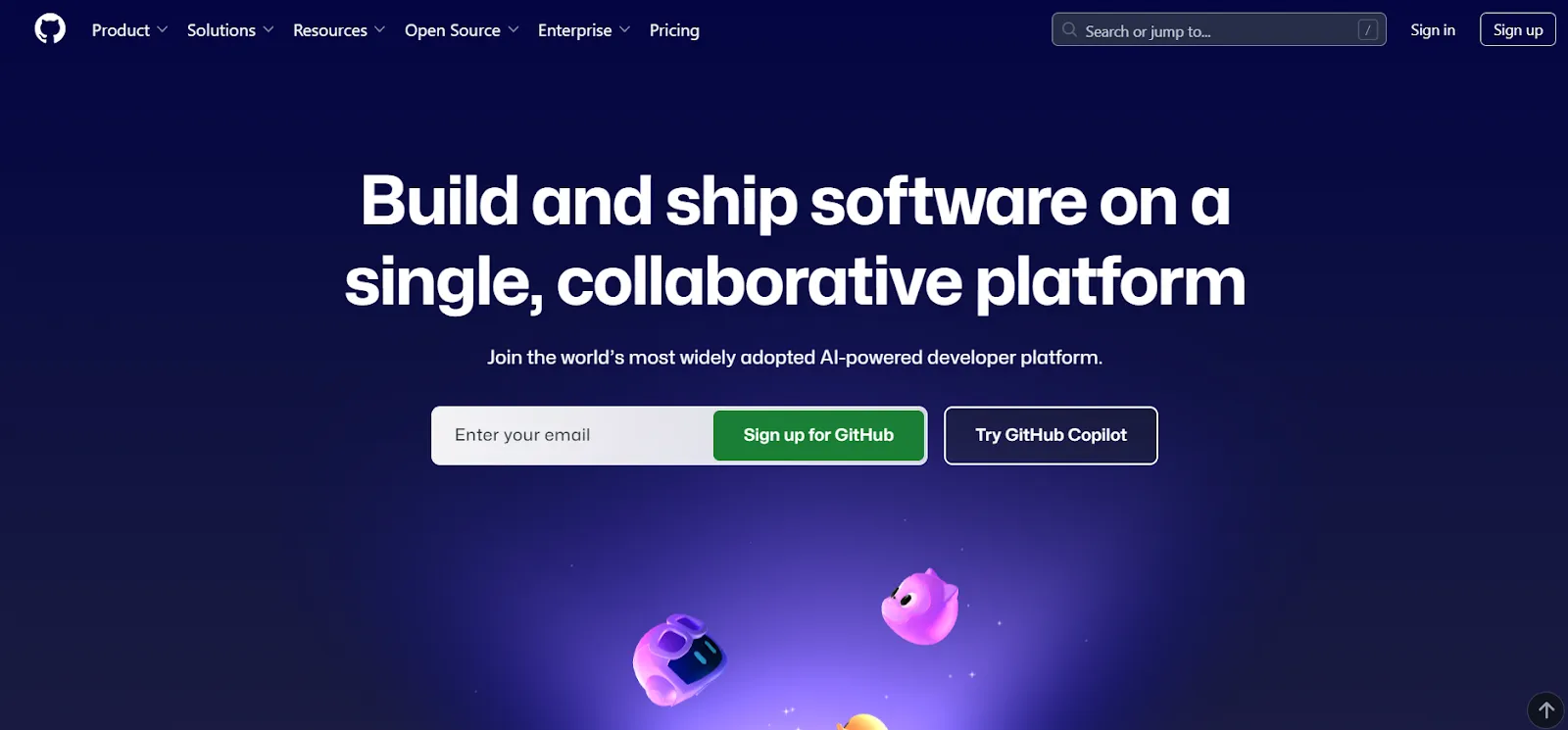
Pros of GitHub
- Unified Platform: Combines code management, collaboration, CI/CD, and project tracking in one interface, making it easier for teams to work without switching tools.
- Popular Developer Ecosystem: GitHub's large community and wide adoption make it easy to find resources, tutorials, and integrations.
- Powerful Integrations: Supports many third-party tools and services for extended functionality, allowing for custom workflows.
- GitHub Actions: Automates build, test, and deployment workflows directly within GitHub, integrating CI/CD into the platform.
Cons of GitHub
- Limited Project Management: While GitHub offers project tracking and issues, it lacks advanced features found in tools like Jira or Trello for larger-scale project management.
- Complex for New Users: GitHub’s interface and features might overwhelm newcomers, especially those not familiar with Git.
- Pricing for Larger Teams: As teams scale, the pricing for additional users and private repositories can become expensive.
- Less Flexibility in Advanced Workflows: While GitHub Actions is powerful, it may not offer the level of customization or advanced features seen in dedicated CI/CD platforms.
GitHub offers the following pricing plans:
- Free Plan: Includes unlimited public repositories, 500MB of GitHub Packages storage, and 2000 Actions minutes/month for CI/CD.
- Team Plan ($4/user/month): Adds advanced collaboration features, including code owners, protected branches, and 3,000 Actions minutes/month.
- Enterprise Plan ($21/user/month): Includes additional enterprise-level features such as compliance tools, more extensive security, and a higher volume of CI/CD minutes.
GitHub is a great tool for teams that want a unified platform for development, collaboration, and DevOps automation, but its project management features may not be sufficient for larger or more complex projects.
4. GitLab
GitLab combines Git repository management, issue tracking, CI/CD pipelines, and monitoring in a single interface, which eliminates the need for integrating multiple tools. Also, it offers issue tracking that includes time tracking and collaborative features. GitLab provides an effective and up-to-date option for teams looking to streamline their toolchain and align their workflows.
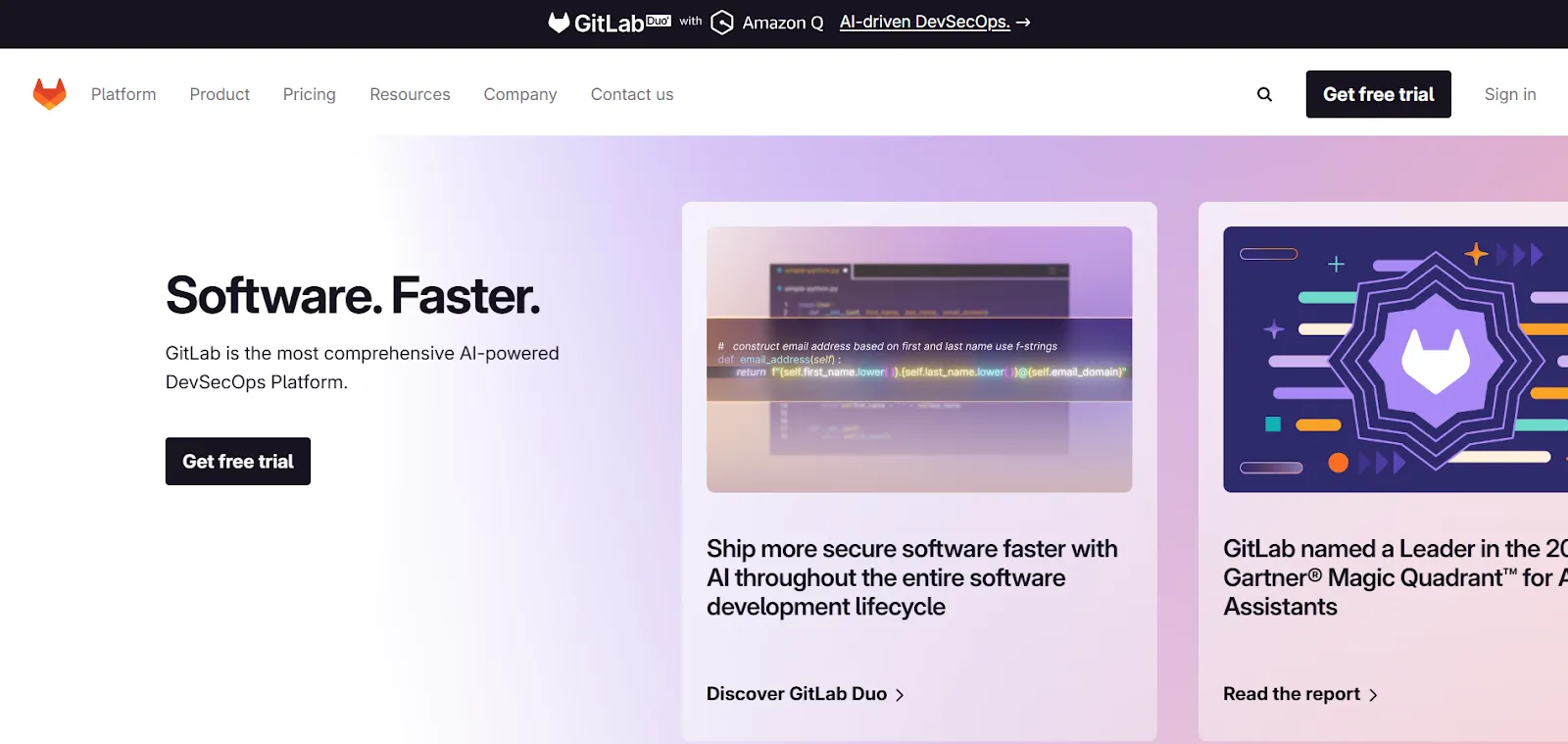
Pros of GitLab
- All-in-One Platform: Combines Git management, CI/CD, project tracking, and monitoring in one interface, reducing the need for multiple integrations.
- Comprehensive Issue Tracking: Includes built-in issue tracking with time tracking, making it easier for teams to manage tasks and monitor progress.
- Advanced CI/CD Pipelines: GitLab provides robust CI/CD capabilities, allowing teams to automate deployment and testing processes seamlessly.
- Security Features: Built-in security features, such as code scanning and vulnerability management, help teams identify risks early in the development cycle.
Cons of GitLab
- Complex User Interface: The platform can be overwhelming for new users, especially with the wide range of features and settings to configure.
- Performance Issues: Some users report slow performance, especially when dealing with large projects or a high volume of users.
- Learning Curve: Due to its broad range of features, there can be a steep learning curve, especially for teams that only need basic version control or CI/CD capabilities.
- Limited Integrations: While GitLab provides many built-in features, it may not offer as many third-party integrations as other platforms like GitHub.
GitLab offers the following pricing plans:
- Free Plan: Includes core features like Git repositories, issue tracking, CI/CD pipelines, and basic monitoring.
- Premium Plan ($19/user/month): Adds advanced CI/CD features, priority support, and increased security controls.
- Ultimate Plan ($99/user/month): Offers advanced security, compliance tools, and enterprise-level features, including dedicated support and enhanced scalability.
GitLab is an excellent option for teams that want an all-in-one platform with integrated features for version control, project management, CI/CD, and monitoring, though its complexity and performance may be an issue for some users.
5. Codefresh
Codefresh is a continuous deployment platform based on GitOps principles, designed specifically for Kubernetes workloads. It is a compelling alternative offering streamlined Kubernetes deployments and powerful GitOps, enabling declarative infrastructure and applications management.
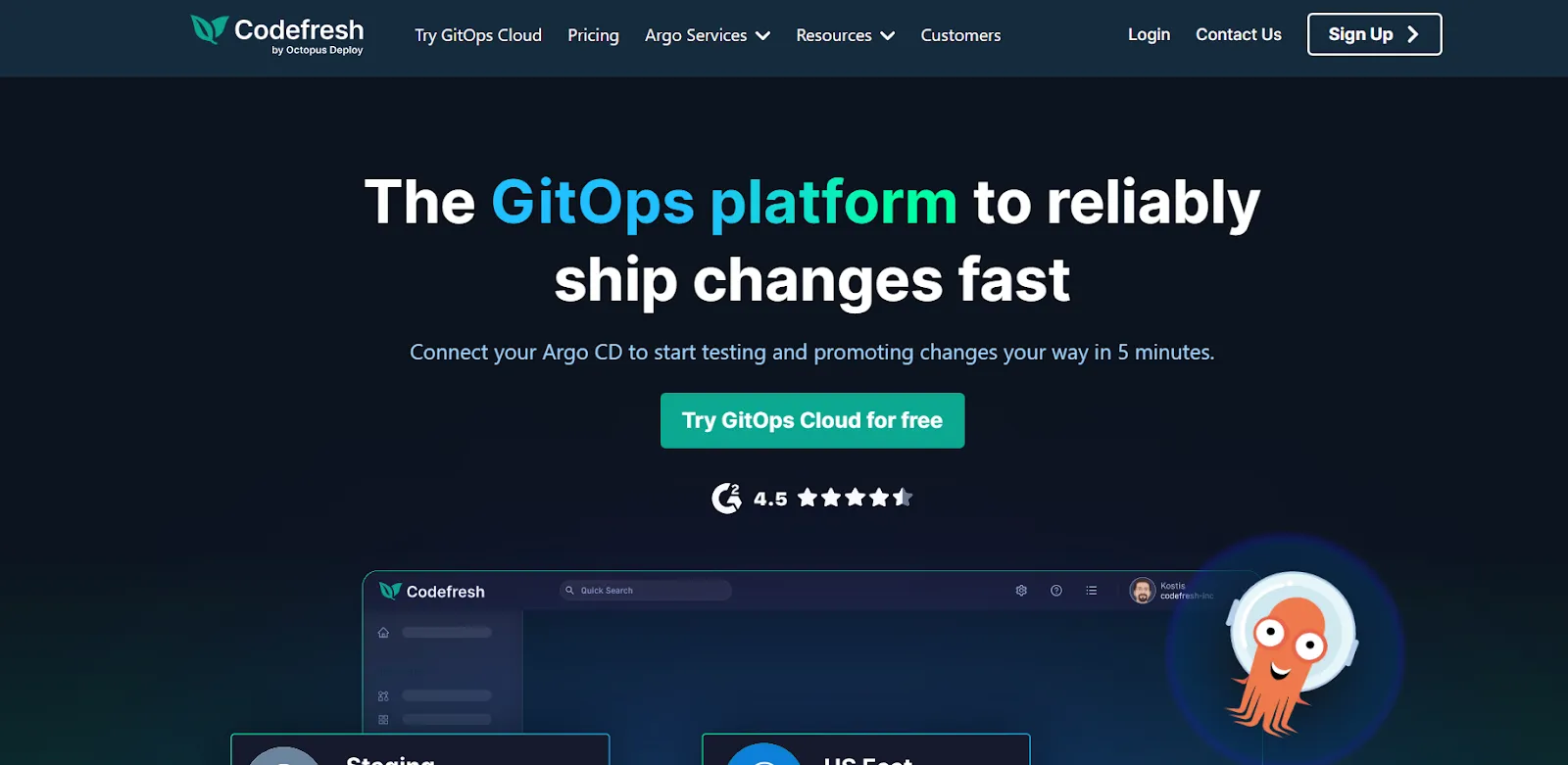
Pros of Codefresh
- Kubernetes-Focused: Codefresh is specifically optimized for Kubernetes, offering deep integrations that make Kubernetes deployments and management easier.
- GitOps Principles: The platform follows GitOps principles, allowing teams to manage infrastructure and applications declaratively through Git repositories, ensuring consistency and scalability.
- Fast and Reliable Deployments: Codefresh supports parallel processing and optimizes deployment speed, making it ideal for high-frequency deployments in Kubernetes environments.
- Easy Integration with CI/CD: Codefresh seamlessly integrates with existing CI/CD workflows, providing a robust solution for continuous integration and deployment pipelines.
Cons of Codefresh
- Kubernetes-Centric: Codefresh is heavily focused on Kubernetes, which may limit its utility for teams that do not use Kubernetes or need broader infrastructure management tools.
- Learning Curve: Teams unfamiliar with GitOps or Kubernetes may face a learning curve when adopting Codefresh, especially with its advanced configuration options.
- Pricing Complexity: While Codefresh offers powerful features, its pricing structure can become complex for teams with varying needs, particularly as they scale.
- Limited Non-Kubernetes Support: Codefresh lacks native support for non-Kubernetes environments, which may be a disadvantage for teams with diverse tech stacks.
Codefresh offers the following pricing plans:
- Free Plan: Includes 500 build minutes/month, one active user, and one concurrent build.
- Pro Plan ($12/user/month): Adds 5,000 build minutes, unlimited users, and up to 5 concurrent builds, along with basic support.
- Enterprise Plan (Custom pricing): Offers advanced features such as additional build minutes, enhanced security, priority support, and more customization options for large-scale teams.
Codefresh is a solid choice for teams deeply invested in Kubernetes and GitOps workflows, though it may not be the best fit for teams looking for broader infrastructure management or flexibility outside of Kubernetes.
6. Azure DevOps
Azure DevOps is an alternative that offers an integrated set of tools for the entire software development lifecycle. Azure DevOps brings together project management, version control, CI/CD, and artifact management into one platform. Unlike Atlassian's fragmented toolset, which requires integrating multiple products, Azure DevOps provides a unified platform that combines project tracking, version control, and CI/CD into one seamless platform.
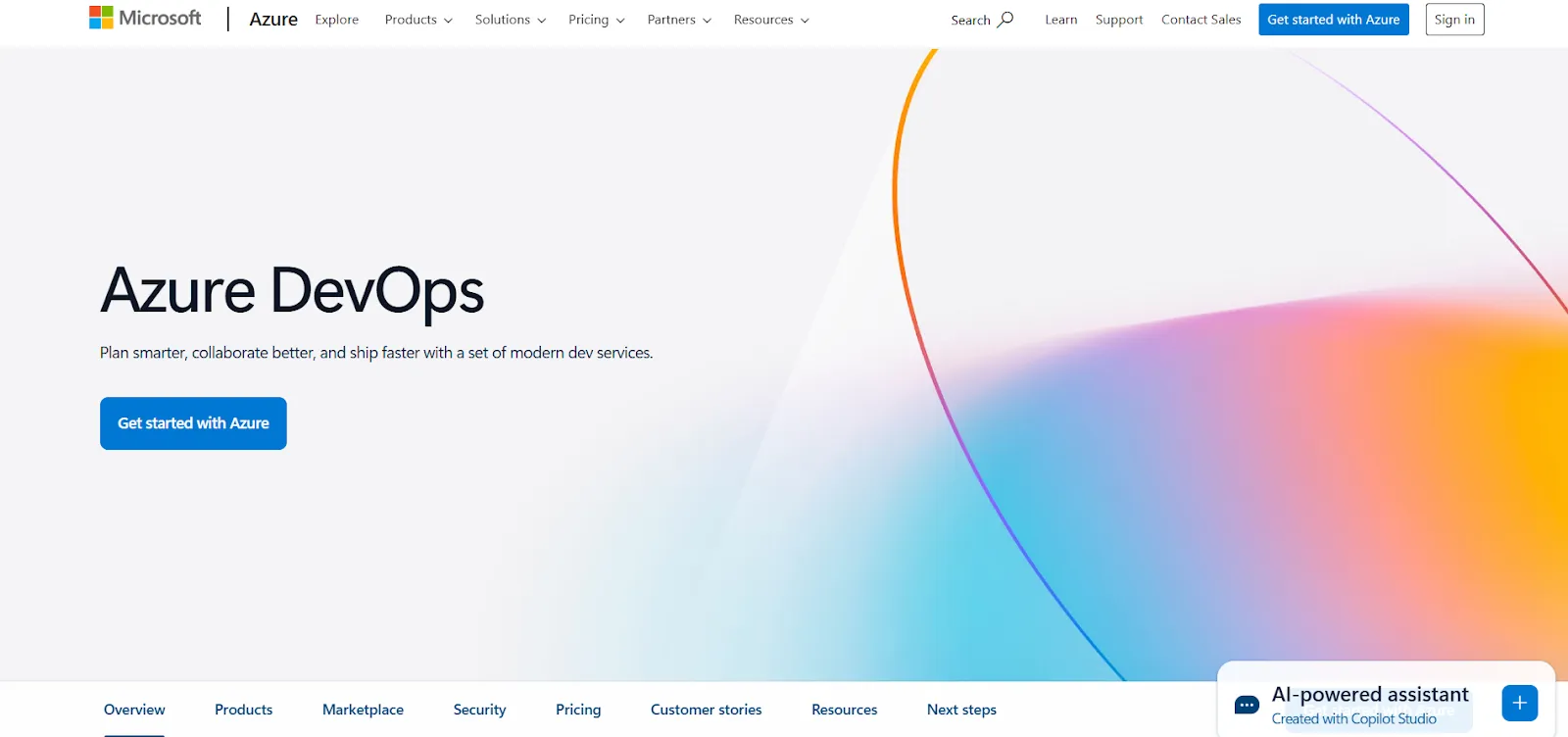
Pros of Azure DevOps
- All-in-One Solution: Azure DevOps combines project management, version control, CI/CD, and artifact management into one platform, simplifying workflows and eliminating the need for third-party integrations.
- Scalable and Flexible: Azure DevOps is highly scalable and works well for teams of all sizes, from small startups to large enterprises. It supports both cloud-hosted and on-premises setups.
- Strong Microsoft Integration: Being part of the Microsoft ecosystem, Azure DevOps offers excellent integration with other Microsoft products, making it an appealing choice for teams already using tools like Visual Studio and Azure.
- Customizable: Azure DevOps offers a wide range of customizable features, allowing teams to tailor the platform to their specific needs, whether they are focused on CI/CD or project management.
Cons of Azure DevOps
- Steep Learning Curve: Due to its vast array of features and configurations, new users may face a steep learning curve when initially setting up Azure DevOps, especially for teams unfamiliar with Microsoft tools.
- Complexity for Smaller Teams: Smaller teams may find the platform overly complex for their needs, especially if they do not require all of the advanced features that Azure DevOps offers.
- Pricing Complexity: Azure DevOps pricing can become complicated as teams scale, and the platform offers a wide variety of paid add-ons that can add up over time.
- Limited Non-Microsoft Integrations: While Azure DevOps excels in the Microsoft ecosystem, integrating it with non-Microsoft tools and services may not be as seamless as other alternatives like GitLab or GitHub.
Azure DevOps offers the following pricing plans:
- Free Plan: Includes five users and 1,800 build minutes per month.
- Basic Plan ($6/user/month): Adds additional users with access to all basic features like version control, work tracking, and CI/CD pipelines.
- Basic + Plan ($52/user/month): Offers the full suite of tools, including advanced features like artifact management and enhanced collaboration tools.
- Azure DevOps Server (On-Premises): Custom pricing for on-premises setups, tailored to large teams and enterprises.
Azure DevOps is a powerful and comprehensive platform, but its complexity and pricing structure may make it better suited for larger teams or organizations already integrated into the Microsoft ecosystem.
7. JetBrains Space
JetBrains Space is a great all-in-one platform that is a strong alternative to Atlassian by combining Git-based version control, CI/CD pipelines, project management, team communication, and documentation in a single interface. Unlike Atlassian, JetBrains is a platform for deep integration across development, collaboration, and deployment workflows.

Pros of JetBrains Space
- Unified Environment: Everything from code to chats to issues and builds exists in one space, reducing tool switching and context loss.
- Built-in Team Communication: Includes chat, meetings, calendars, and collaborative documents, eliminating the need for third-party messaging or planning tools.
- Tight Integration with JetBrains IDEs: Seamless connectivity with IntelliJ IDEA and other JetBrains products enhances productivity for developers already in the JetBrains ecosystem.
- Customizable Automation: The automation feature allows you to define CI/CD workflows using Kotlin DSL, which is powerful for JetBrains-savvy teams.
Cons of JetBrains Space
- Relatively New Platform: Still maturing in terms of features compared to more established alternatives like GitHub or GitLab.
- Limited Third-Party Integrations: Compared to Atlassian or GitHub, Space currently offers fewer third-party integrations.
- Learning Curve for Kotlin DSL: While powerful, the Kotlin-based automation scripting may be unfamiliar or intimidating for teams not using Kotlin or JetBrains IDEs.
- Pricing for Full Features: Some advanced features (like extensive automation or larger storage) require moving to higher-tier plans, which can get expensive for larger teams.
JetBrains Space offers the following pricing plans:
- Free Plan: Includes 10 GB storage, 120 build credits/month, limited roles, and basic project tools.
- Team Plan ($8/user/month): Adds more storage (100 GB), 2,500 CI credits/month, advanced permissions, and external guest users.
- Organization Plan ($20/user/month): Offers 500 GB storage, 10,000 CI credits/month, issue boards, code quality gates, and other advanced features.
- Enterprise Plan (Custom Pricing): Includes all features with scalability for large organizations, SAML SSO, audit logs, and priority support.
JetBrains Space may not be the best fit for those relying heavily on external integrations or looking for a more mature ecosystem.
How to Choose the Right Alternative for Your Team
With so many options available, choosing the right alternative for your team can be a tricky thing. The key is to assess your team’s specific needs, workflows, and priorities to find a solution that aligns with your business goals. Here are some important factors to consider when selecting the right tool:
- Evaluate Workflow: You need to assess whether you need simple task tracking or a comprehensive project management system.
- Ease of Use: A key consideration is how user-friendly the platform is. A user-friendly interface enhances efficiency, especially for team members without technical expertise.
- Budget: It is important to evaluate the cost of every alternative that will fit your budget and needs. Consider how the tool will scale with your team as it grows.
- Integration: Look for a platform that can automate repetitive tasks and easily integrate with CI/CD pipelines, Git repositories, and cloud platforms.
- Feedback: Involve your team in the decision-making process and gather feedback for your functionality. This will ensure that you choose an alternative that everyone can adopt easily and use effectively.
By considering these factors, you can find a solution that streamlines your team’s work while enhancing productivity.
To Sum Up
As teams evolve and software development practices become more streamlined, the need for flexible, cost-effective, and integrated tools increases. The seven Atlassian alternatives we’ve explained offer a range of benefits that will fit your business needs. Whether your team prioritizes advanced development workflows or scalable solutions, there’s a platform for improved productivity and efficiency. By carefully evaluating the workflow and these alternatives, you can choose the right platform for you.
Subscribe to receive the latest blog posts to your inbox every week.
*By subscribing you agree to with our Privacy Policy.

Relevant Posts

